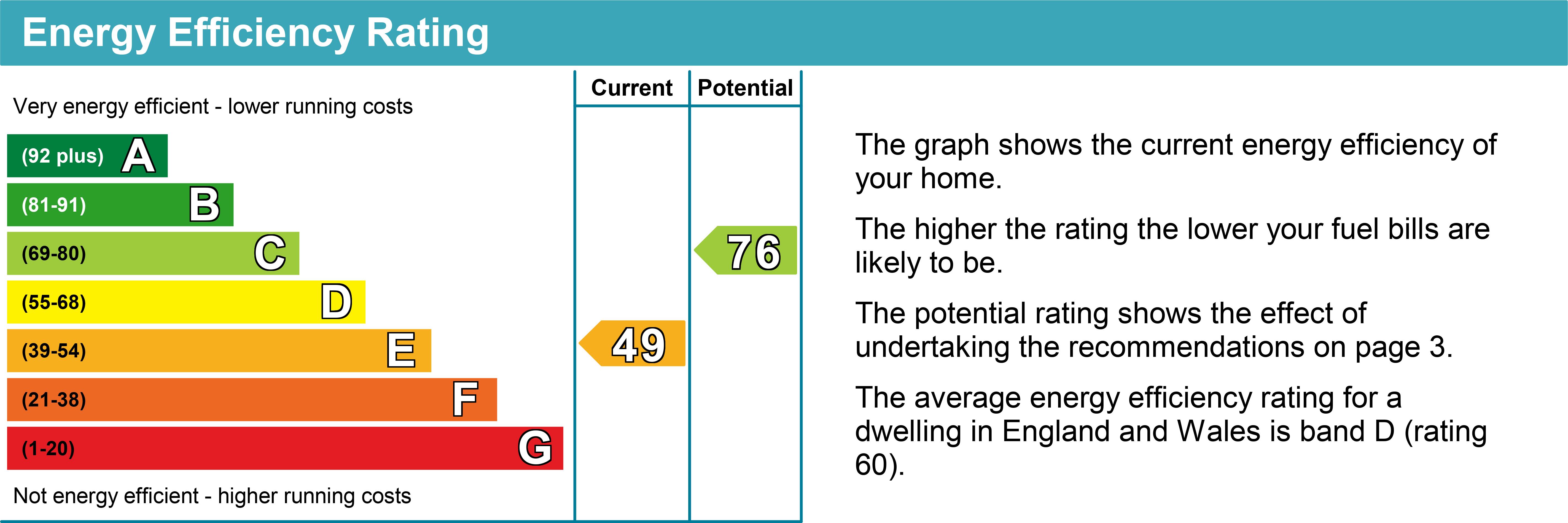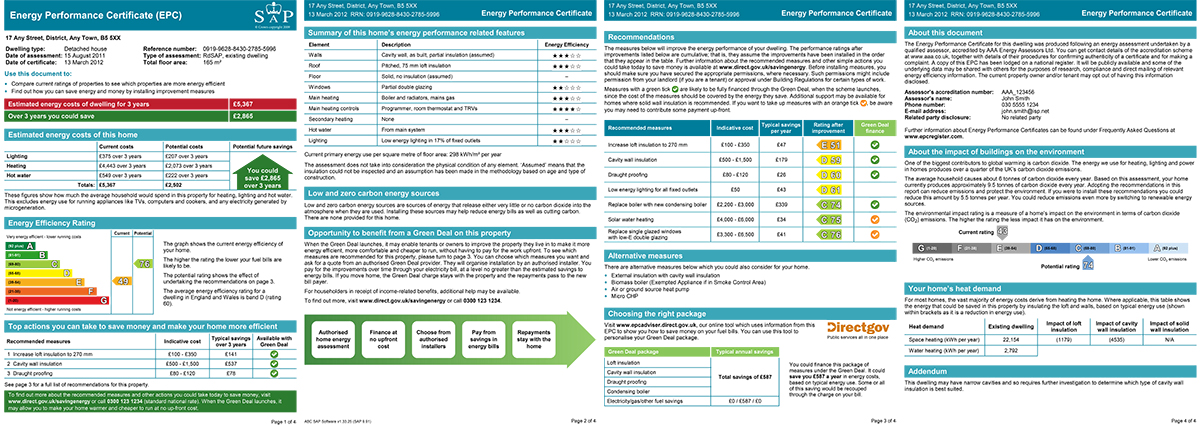The benefits of Energy Performance Certificates for property owners
[edit] Reasons to be EPC-ful.
It’s time for a fresh look at the many ways an Energy Performance Certificate can be beneficial to property owners.
In the same way that Home Reports have become an accepted part of the residential property market so have Energy Performance Certificates (EPCs) become a fundamental tool in the assessment of a building’s essential worth.
The EPC provides a colour-coded and easily understandable rating of a property’s energy usage and its carbon dioxide emissions and, with the Home Report, offers advice on how to reduce carbon footprint, improve the rating – and save money.
This is of increasing importance because, in these energy-conscious and – for many people – cash-strapped times, home buyers are turning to the EPC in the first instance to get an immediate snapshot of what their utility bills are going to be like.
In point of fact, the bare legislative reasons for obtaining an EPC are actually pretty limited and can be summed up as Selling, Renting or Building, in all of which cases the certificate has to be in place before a move is made.
So, before you consider putting a property on the market, letting a home out as a private landlord or re-mortgaging, the energy usage has to be pinned down according to an agreed set of parameters.
What is not so well known is that an EPC can be of considerable worth outwith these regulatory requirements, and can offer valuable guidance on where improvements can be made both on emissions and on costs.
For instance, great numbers of people are looking to home improvements, such as extensions, as an alternative to moving home and an EPC can point the way towards the type of improvement which would create the best value for money.
It is also worth re-certificating post-improvement, so that the upgrades are reflected on the EPC, and a new certificate should be a part of a retrofit assessment.
The certificates can be a deciding factor as part of a grant scheme approval and, if a certificate has expired – its current shelf-life is 10 years – a newer EPC will better reflect current fuel generation practices and costs.
So, it is fair to say that EPCs have, over the years, focused people’s thinking about the profligacy of our energy use, and it is worth considering other ways of moving the little green arrows of current and potential consumption from G up towards A.
The Energy Saving Trust, which holds the public register of EPCs has a wealth of information about how to cut down on our personal impact on the future of the planet, but it also has some snappy, quick fixes for home owners:
- Take back control of the thermostat. By working out when you do and don’t need to heat the property, it is possible to dramatically reduce wastage.
- Wrap it up. Purchasing and tightly fitting an insulation jacket to a hot water storage tank can keep the water hotter for longer and uses less energy.
- Keep it in. Gaps around older windows are an easy route for warm air to escape. Seal those gaps.
- Have a light bulb idea. LED bulbs use significantly less power to produce the same light level as old tungsten bulbs, and they are a simple like-for-like swap.
- Seek the Eco. Many appliances such as white goods have an eco-mode, and you can save considerably by switching TVs and computers off rather than using standby-mode.
- Draw the curtains. Heavy curtains prevent heat loss through glass, especially on large windows or patio doors.
Other energy saving routes may require professional help, such as installing loft and wall insulation, replacing your boiler and installing solar panels. Purchasing efficient white goods – which have ratings like EPCs – will also contribute to your energy reduction.
Many energy providers will now supply a smart meter, which allows you to actively track energy usage and identify energy intensive activities.
It is worth the effort – for the planet as well as your pocket.
Article written by Calum Allmond, Head of Architectural Services at DM Hall Chartered Surveyors supplied via press release from Blueprint Media. Sample EPC's from assets.publishing.service.gov.uk. see external links.
[edit] External Links
- https://assets.publishing.service.gov.uk/government/uploads/system/uploads/attachment_data/file/5996/2116821.pdf
- www.dmhall.co.uk
- https://www.gov.scot/policies/homeowners/home-reports/
- https://www.mygov.scot/energy-performance-certificates
- https://energysavingtrust.org.uk/energy-at-home/
[edit] Related articles on Designing Buildings
- Display energy certificate.
- Emission rates.
- Energy certificates for buildings
- Energy performance certificate EPC
- Energy certificates for buildings.
- Energy efficiency of traditional buildings.
- Energy Performance of Buildings Directive.
- Energy Savings Opportunity Scheme.
- Energy targets.
- Reliance data in EPC contracts
- Target emission rate TER
- What is an EPC contract?
Featured articles and news
Building Safety recap January, 2026
What we missed at the end of last year, and at the start of this...
National Apprenticeship Week 2026, 9-15 Feb
Shining a light on the positive impacts for businesses, their apprentices and the wider economy alike.
Applications and benefits of acoustic flooring
From commercial to retail.
From solid to sprung and ribbed to raised.
Strengthening industry collaboration in Hong Kong
Hong Kong Institute of Construction and The Chartered Institute of Building sign Memorandum of Understanding.
A detailed description fron the experts at Cornish Lime.
IHBC planning for growth with corporate plan development
Grow with the Institute by volunteering and CP25 consultation.
Connecting ambition and action for designers and specifiers.
Electrical skills gap deepens as apprenticeship starts fall despite surging demand says ECA.
Built environment bodies deepen joint action on EDI
B.E.Inclusive initiative agree next phase of joint equity, diversity and inclusion (EDI) action plan.
Recognising culture as key to sustainable economic growth
Creative UK Provocation paper: Culture as Growth Infrastructure.
Futurebuild and UK Construction Week London Unite
Creating the UK’s Built Environment Super Event and over 25 other key partnerships.
Welsh and Scottish 2026 elections
Manifestos for the built environment for upcoming same May day elections.
Advancing BIM education with a competency framework
“We don’t need people who can just draw in 3D. We need people who can think in data.”
Guidance notes to prepare for April ERA changes
From the Electrical Contractors' Association Employee Relations team.
Significant changes to be seen from the new ERA in 2026 and 2027, starting on 6 April 2026.
First aid in the modern workplace with St John Ambulance.
Solar panels, pitched roofs and risk of fire spread
60% increase in solar panel fires prompts tests and installation warnings.
Modernising heat networks with Heat interface unit
Why HIUs hold the key to efficiency upgrades.


























